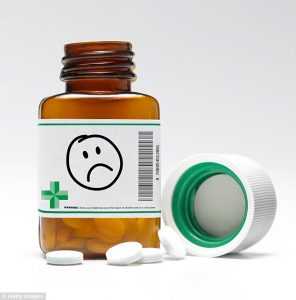
NHS patients are prescribed psychiatric drugs to treat anxiety, insomnia and depression, the side effects of which are killing thousands.
These drugs are the third major killer after heart disease and cancer in the UK , so why are doctors handing them out like smarties (candy)?

BYPASS THE CENSORS
Sign up to get unfiltered news delivered straight to your inbox.
You can unsubscribe any time. By subscribing you agree to our Terms of Use
Latest Video
In a new book, Professor Gøtzsche reveals the huge scale of the problem. In an article for the Mail Online he writes:
More than 80 million prescriptions for psychiatric drugs are written in the UK every year. Not only are these drugs often entirely unnecessary and ineffective, but they can also turn patients into addicts, cause crippling side-effects – and kill.
For instance, antipsychotics, commonly given to dementia patients to keep them quiet, raise the risk of heart disease, diabetes and stroke. Psychiatric drugs also make falls more likely, and breaking a hip can shorten life significantly, while some antidepressants are linked to a potentially deadly irregular heartbeat.
 And the death toll from these pills has been grossly underestimated. As I reveal in a new book, Deadly Psychiatry And Organised Denial, the true figure is terrifying: according to my calculations, based on data from published and unpublished sources, for psychiatric drugs are the third major killer after heart disease and cancer.
And the death toll from these pills has been grossly underestimated. As I reveal in a new book, Deadly Psychiatry And Organised Denial, the true figure is terrifying: according to my calculations, based on data from published and unpublished sources, for psychiatric drugs are the third major killer after heart disease and cancer.
As an investigator for the independent Cochrane Collaboration – an international body that assesses medical research – my role is to look forensically at the evidence for treatments.
Previously this has led to me challenging widely-held assumptions about the benefits of breast cancer screening (I’ve calculated that every year in the UK, thousands of women undergo unnecessary treatment because of overdiagnosis), GP health MOTs, and the advice for cutting asthma attacks by using special mattress covers.
All these have certainly ruffled feathers, but what I’ve discovered about the damage caused by psychiatric drugs far outweighs anything else I’ve identified.
In fact, the data on all this is available if you know where to look, but I’m the first person to pull it all together – for instance, finding that the number of suicides among adults and children taking antidepressant drugs is actually 15 times greater than the number calculated by the U.S. drugs watchdog, the Food and Drug Administration.
Yet psychiatrists and GPs generally ignore or deny the appalling scale of this damage from drugs that are all too often used without medical justification.
Just this month, for instance, a study published in the BMJ found that thousands of people in England with learning difficulties are routinely prescribed antipsychotic drugs: these drugs do nothing to help these patients but are used as a chemical cosh.
I was alerted to the failings of psychiatric drugs eight years ago when one of my postgraduate students suggested an idea for her PhD thesis: ‘Why is history repeating itself? A study on benzodiazepines and antidepressants.’
She explained she’d discovered that popular tranquilisers such as Valium (a benzodiazepine drug more popularly known as ‘mother’s little helper’), and before that the barbiturates, had been described as very safe when first introduced, but then turned out to be highly addictive.
When selective serotonin reuptake inhibitors (antidepressants known as SSRIs) came on the market 20 years ago, their big selling point was that they were non-addictive. That proved just as wrong.
I decided to dig deeply into this area, and currently have three PhD students investigating what psychiatric drugs really do to people.
What we have found is truly astonishing. Doctors dispense them in large numbers because they believe drug trials show them to be effective, but the evidence is based on poor science.
The skeletons in this closet have been tumbling out at an alarming rate. Sleeping pills, for instance, stop being beneficial after a couple of weeks, yet patients are left on them for years, while antipsychotics are licensed if they show an effect in two placebo trials, no matter how small that effect is.
Read More: Prescription Drugs Are Britain’s Third Biggest Killer


